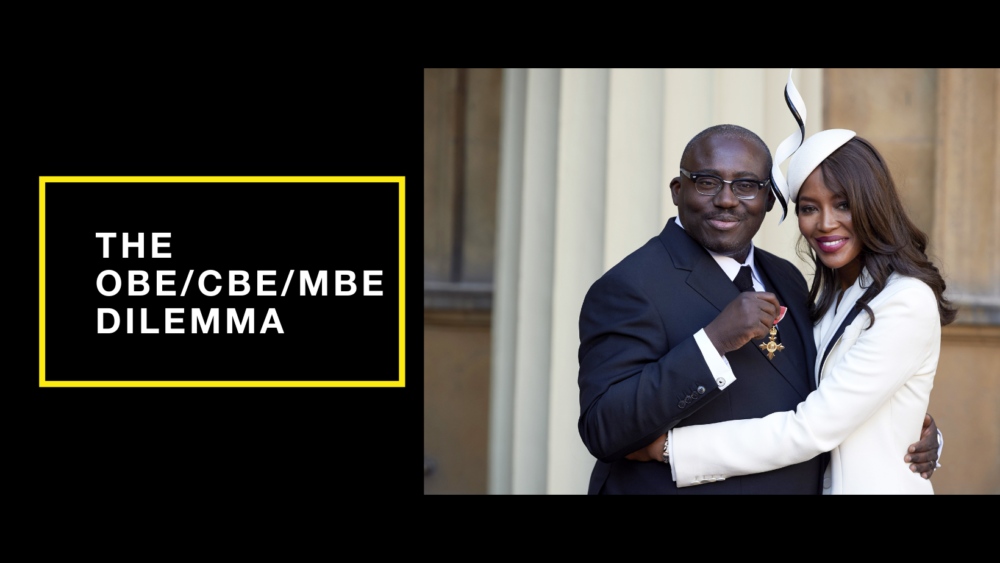Written by
The OBE/CBE/MBE Dilemma
Our relationship with nationhood and the powers which influence it means we are not just citizens, but are also ambassadors for countries we have little management of. Thankfully, the MBE exposes this warped power dynamic.
State accolades are less about choosing or rejecting the Empire as the awards process is not one you opt into. Instead, these medals reflect our inescapable attachment to the state, meaning our status in this nation is less important to the nation when compared to what entitlements the Empire can extract from us.
Established in 1917 by King George V, the ‘Most Excellent Order of the British Empire’ has been awarded to people who have made public service contributions within the UK or Commonwealth countries. It is the first award tier of several and explicitly excludes civil service duties.
Like many institutional commendations, the ‘-BE’ was designed to celebrate citizens who an institution deemed exemplary. As such, the award became a status symbol; one which grants an awardee both a degree of leverage in their industry and a weapon to discredit their detractors. In this dynamic, the award can be viewed as a way in which the Monarchy remains relevant socially, despite their diminished political power.
Yet this does not go unopposed. In 2003, Benjamin Zephaniah controversially rejected the award claiming that it reminded him of ‘thousands of years of brutality’, adding that ‘it reminds [him] of how [his] foremothers were raped and [his] forefathers brutalised’. Zephaniah was proactive in his rejection of the awards process and the monarchy which issued it, implicitly challenging the institution’s unopposed influence in the social and democratic space.
Yet whilst I find Zephaniah and more recently George the Poet’s positions agreeable, supporting the idea that rejecting a regime which negatively impacts you is a valid form of counter-resistance; the conversation since 2003 has stagnated. Because whilst even the staunchest republican may reject the monarchy, few talk about how we are viewed in the power dynamic.
For the MBE and its affiliated awards are given to people who have been deemed to be of service. These individuals who, without request, have exchanged their labour for monarchic favour, often unintentionally. David Bowie, a former rejecter of the award is one such inadvertent labour exchanger, as was Zephaniah. However, a caveat must be made to acknowledge that intentional Monarchic grifting is sometimes rewarded, like Winson Church who was knighted after his premiership.
Regardless, what this award proposes is that there is a selection of people who must be called and celebrated. However, when you analyse that this call sheet also considers individuals who stand ideologically opposed; you quickly realise that the award is somewhat nonchalant of personal opinion.
It forces us to reflect on our position in this power dynamic and why an institution feels entitled to our labour. It also forces us to question how we can serve an empire without ever working to do so and how we are attached to the idea of the nation as a whole. Such questions reveal that whilst we might work for self-fulfilment, bettering our lives and families, it is not perceived so simply. Instead, this reinterpretation of our intention and output reveals a contract where we are always perceived as ambassadors to this nation.
Thus, the MBE not only explains why we are encouraged to revere the monarchy as the contract’s creator, it also justifies our unnegotiated place as servants within this social contract. And since the award has the allure of lifting us into a new class of recognised individuals, the MBE also offers some the opportunity to be free from said contract.
This combination of reverence, individuality and subjugation is perhaps why people who will never be eligible for the reward, take such offence at others rejecting it. For if they are never recognised for benefiting the empire whilst others who reject the Empire are acknowledged; the futility of their work, the social contract and the hierarchy it protects are all revealed.
It’s potentially why the MBE must continue to exist for the Monarchy in a democractic nation. As once you remember that these awards are issued via invitation rather than request, an effort to renew this contract is revealed.
Thus the MBE becomes positioned as impossible to critique. For if all work serves to benefit the Empire and we have no say in being recognised, even work which hopes to repair the damage done by the Empire, contributes to its legacy.
The MBE should be better understood as a prison sentence, one which recognises your work as having already been done and is being responded to with what is understood as justice.
As such, the decision to reject colonial rewards cannot be separated from your existing legacy of work, for the Empire has already used your work to benefit itself.









This was a fun piece to make. Thanks for making it happen.